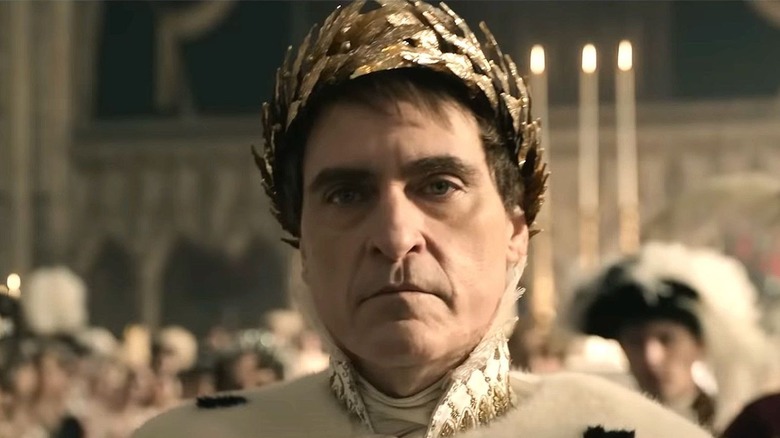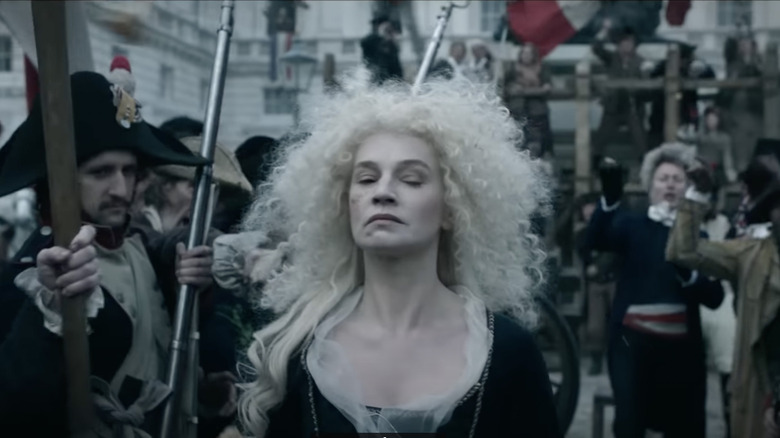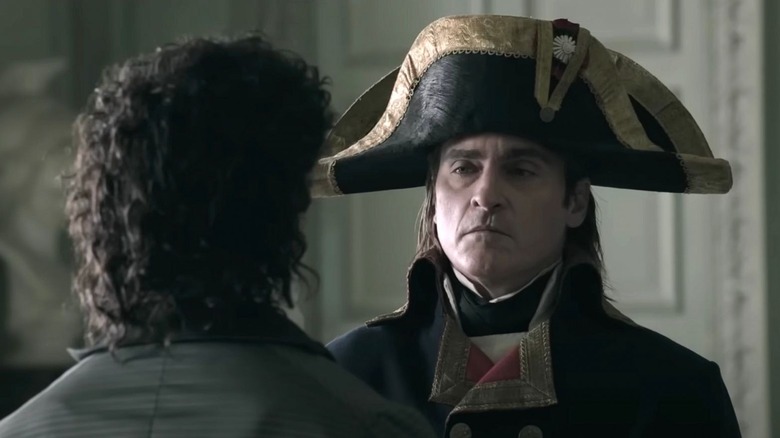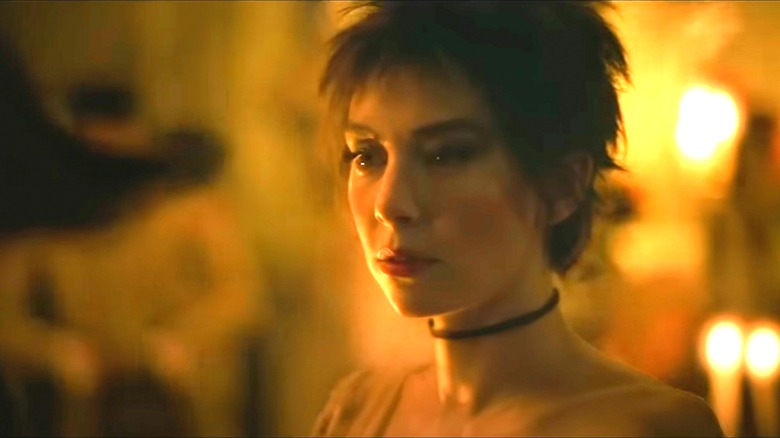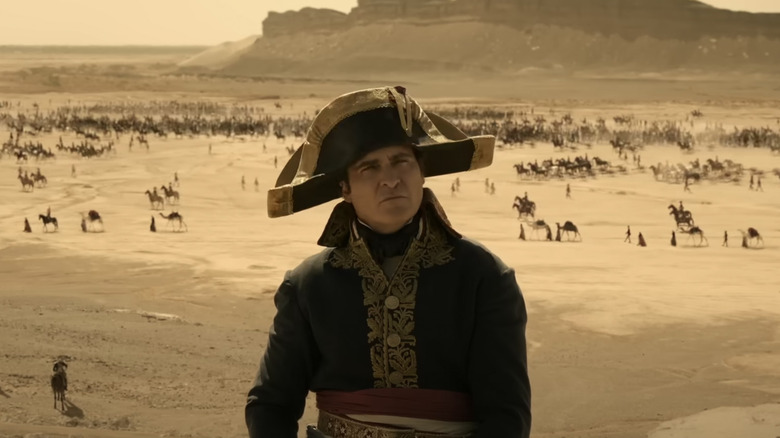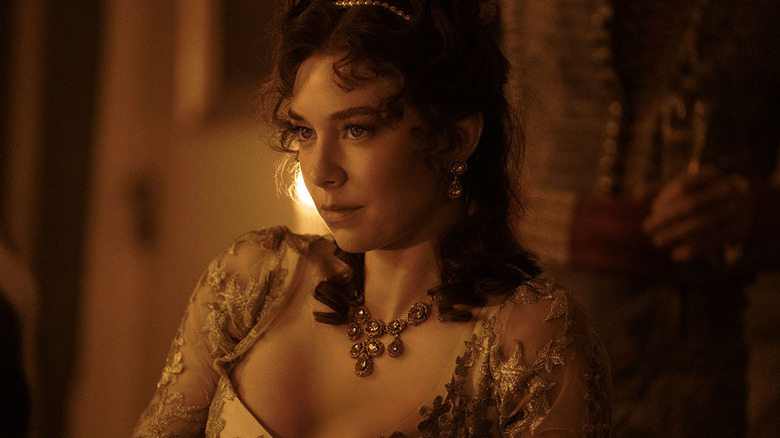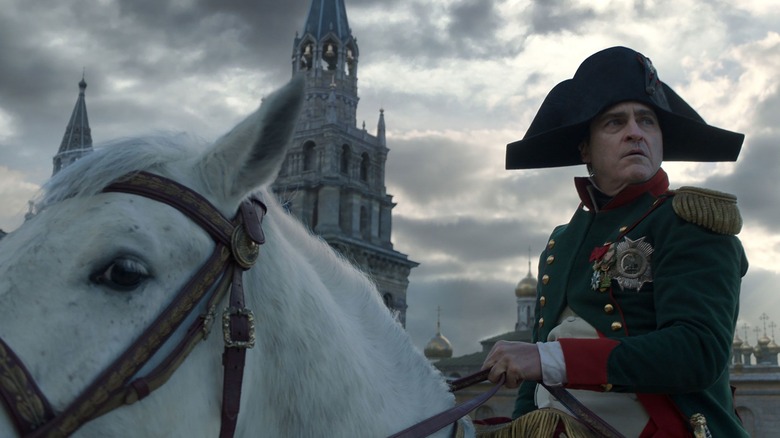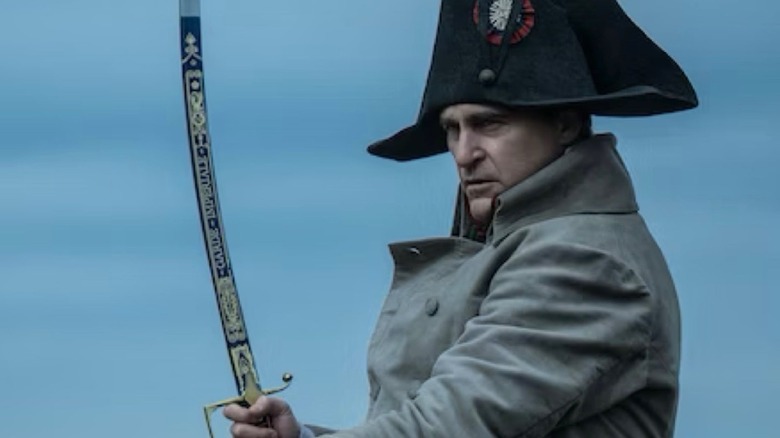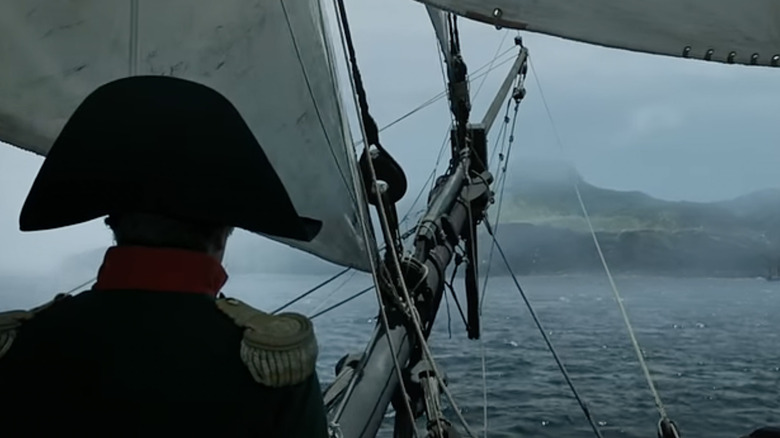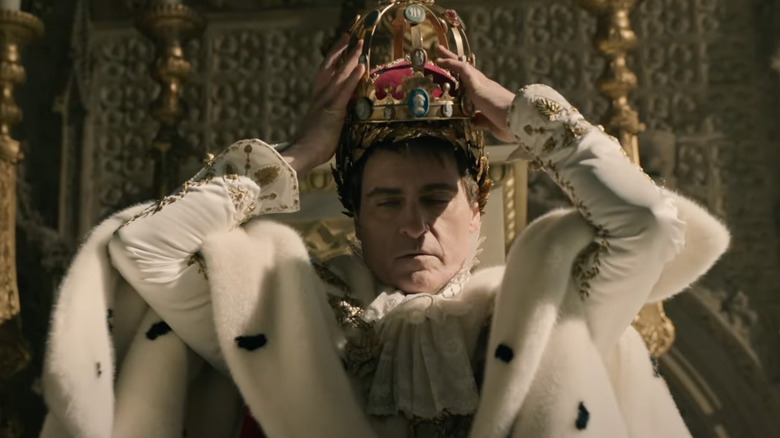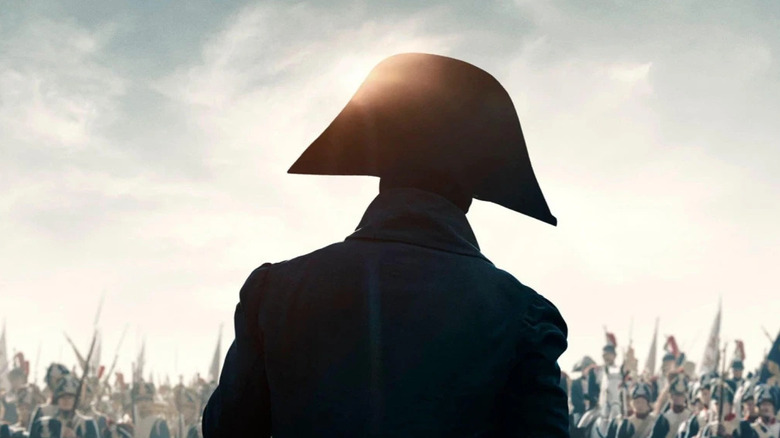Things Napoleon Left Out Of The True Story
Few figures from history lived lives so big that, counterintuitively, they don't make ideal candidates for cinematic adaptation. Napoleon Bonaparte is such a character. That hasn't stopped ambitious filmmakers from trying.
The first was a short — 1909's "Napoleon and the Empress Josephine" — which covers half of the territory of the latest, 2023's "Napoleon." In between, projects about the military mastermind turned Emperor turned exiled abdicant have ranged from the comprehensive (like Abel Gance's 1927 silent film of the same name, which clocks in at more than five hours to Ridley Scott's two and a half) to the more narrowly focused (like 1970's "Waterloo"). Scott's "Napoleon" attempts to split the difference. It isn't a birth-to-death biography, but it doesn't tell his story through the lens of a single battle or key event, either. Instead, it plays like an action-packed, politically intriguing, sexually comedic highlight reel that jumps between battlefields, ballrooms, and bedrooms... sometimes at breakneck pace and with disorienting transitions.
In so doing, "Napoleon" leaves out not only years' worth of history, but also some important context and nuance for the sake of dramatization. Scott's fully aware of this; in an interview with The New Yorker, he responded to a historian's critiques by saying, "Get a life." Still, some movie and/or history buffs might want to know what the film changes and what it leaves out, regardless of how much they enjoyed the thrilling war sequences and the fraught romance.
What Marie Antoinette's execution was really like
Ridley Scott's film opens with a scene in which a young-ish Napoleon (Joaquin Phoenix) lurks in the crowd as Marie Antoinette (Catherine Walker) is paraded through the masses on her way to the guillotine. As the revolting citizens scream and throw rotten tomatoes at her, the deposed queen remains defiant. She's styled in a tight-fitting dark dress with multiple layers of blonde hair cascading from her soon-to-be-detached head.
Marie Antoinette's beheading was a significant moment in the French Revolution and the Reign of Terror... the onslaught of public executions, especially of aristocrats, is referenced in the movie. However, "Napoleon" doesn't explain the circumstances that led to Marie Antoinette's death sentence, nor does it depict her final moments as they truly happened. The real Marie Antoinette was a broken woman by that fateful day. Having been widowed by her husband's own trip to the guillotine, imprisoned with her children, and eventually separated from her son, she was wrongly and humiliatingly accused of incest at her trial. The stress took a toll on her appearance; she was gaunt, her hair (which had turned white) had been cut short, and she wore a modest white dress and cap.
On the morning of her execution, her mind was on her children; she wrote a final letter expressing regret that they'd be left without a mother. Before the blade fell, she even apologized to the executioner for stepping on his foot. Also of note, Napoleon wasn't in attendance. On October 16, 1793, he would've already been occupied with the Siege of Toulon.
Napoleon's noble birth
The poster and the trailer for "Napoleon" capitalize on the idea that he's an Alexander Hamilton-like character who used wit and war to come from nothing and conquer everything. That's the attitude of many of the characters within the film as well. They speak of him as if he's a Corsican street rat and call him "unfit for office." In the first act of the movie, Napoleon is shown outfitted in relatively dirty clothes compared to the other men who are rising within the ranks of the newly republican-leaning French military, implying his is a real rags to riches story. This framework certainly makes Napoleon's ascension to power more dramatic, but it's only partially accurate.
Frank McLynn's 1997 book "Napoleon: A Biography" delves into his ancestry and early life. The Buonapartes were actually Corsican nobility. His father, Carlo, had studied law and his mother, Letizia, had a dowry. While familial titles were more common in Italy and didn't necessarily come with much power or wealth, Napoleone Buonaparte (who would later modify the spelling of his name) was born with distinct advantages that directly led to his success. Because of his family's nobility, minor though it was, a juvenile Napoleon was able to attend good quality schools, especially once the French were in control of the island. His father had to produce documents proving noble birth going back four generations, but once he did, Napoleon was admitted to a prestigious military academy.
How he really met Josephine
As played by Vanessa Kirby, Josephine enters Napoleon's life — and the movie — when she's released from prison following the end of the Reign of Terror. The now-famous rising star within the military meets her at what's termed a survivors ball. Josephine's hair is still shorn from her captivity and she's dressed as if she's a courtesan, but Napoleon can't stop staring. Shortly thereafter, a boy confronts him about his late father's ancestral sword. Napoleon acquiesces, going against the law, and personally delivers the sword to what turns out to be Josephine's home.
Here, Ridley Scott's film entirely leaves out the fact that Napoleon had a fiancé at the time. He was engaged to marry Désirée Clary, the sister of his brother Joseph's wife, Julie. While survivors or victims balls may have occurred, there's no record of Napoleon meeting Josephine at one. According to "Napoleon: A Biography," however, there was a lingering story in the public imagination regarding the business with the sword, and it went almost exactly as their second meet-cute does in the film. Josephine (whose real name was Rose) thanks Napoleon for his kindness and the two become lovers. This version of events made for a better story, even at the time, but it's probably not how the relationship began. Napoleon and Josephine moved in the same social circles (she was his one-time ally Paul Barras' mistress) and almost certainly would've been aware of each other's existence. As his reputation became more established, and in light of her own situation (she was an aging widow and mother with few resources), her attention turned from Paul Barras to Napoleon Bonaparte.
What he was doing in Egypt
Immediately following his marriage to Josephine, Napoleon leaves to invade Egypt. His forces can be seen firing on the Pyramids of Giza and the Great Sphinx. Then, he leaves in a huff — at risk of being accused of treason — upon hearing that Josephine is having an affair with a man named Hippolyte Charles.
Napoleon did invade Egypt and Josephine did have an extramarital relationship with Hippolyte Charles, but this segment of the film plays fast and loose with the facts. The real Napoleon traveled to and waged war in Egypt to improve France's trade prospects and to interfere with Britain's. He also imagined himself as an Alexander the Great-like figure who could, by way of becoming a conquering hero, bring Western ideals to the Middle East. But the Battle of the Pyramids took place in Embabeh, a city near Giza. And his men aren't responsible for knocking the nose off of the Sphinx (which is thought to have happened centuries earlier) or causing damage to the Pyramids, which is a misconception Ridley Scott seems to wink at if not endorse.
Finally, Napoleon didn't leave Egypt because of Josephine's infidelity. Biographer Frank McLynn explains that he was losing ground, cut off from intelligence, and realized his political future depended on being back in France. Napoleon's time in Egypt did profoundly impact the field of Egyptology, as is only hinted at in the movie. It led to the discovery of the Rosetta Stone and the construction of the modern Suez Canal, and generally increased interest in the topic.
Who was behind his bad press
Throughout Ridley Scott's "Napoleon," the audience catches glimpses of unfavorable newspaper coverage in which the General then Emperor is called names (like Boney) and drawn as an unflattering caricature. The real Napoleon's relationship with the press isn't made clear in the film. While he did endure ridicule for his personal and political failures, it didn't come at the pens of French journalists. In fact, one of his strengths as a military commander and Emperor was his use of propaganda to bolster his own image and to attack his adversaries. "Napoleon: A Biography" describes how he relied on two newspapers, which he controlled and distributed to soldiers for free, to spin his mistakes and embellish his accomplishments.
Those humiliating headlines in "Napoleon" would've been written and run in England, not France. It was the British who intercepted the letters he exchanged with Josephine during their time apart, when they both were partaking in affairs. The British had a vested interest in belittling the French leader... literally. The very idea of the Napoleon complex comes from British political cartoons. In what the National Post calls "one of the most successful trolling campaigns of all time," the Brits coalesced around a characterization of Napoleon as tiny and temperamental. It stuck, despite the fact that — at 5' 7" — the General then Emperor was taller than the average man of the era. Scott's film even includes a scene in which Joaquin Phoenix's Napoleon has to stand on a box to achieve eye level.
How his second wife felt about him
After Napoleon makes the difficult decision to divorce Josephine, his urgent business becomes the search for a younger and more fertile bride of noble birth. He strikes out with the sister of Czar Alexander, but the Austrians are willing to hand over Archduchess Marie Louise, ostensibly to bolster their alliance with France. Marie Louise arrives at court ready to flirt with her betrothed, telling an awkward Napoleon that he's even more handsome than his portrait. One cut scene later, she's already given birth to the Emperor's first legitimate heir.
Marie Louise was Napoleon's second wife and she bore him a son within the first year of their marriage. Their betrothal was a political calculation, particularly after Alexander rejected Napoleon's offer to wed his sister, Anne. But it was a clumsy political calculation at best in the view of the French citizenry, and Marie Louise wasn't nearly so smitten with her husband upon first glance. Frank McLynn explains that Napoleon believed the marriage would improve his standing with the rest of the European royals (it did not) and that the issue of an heir would pacify the French public (instead, his divorce from Josephine in favor of a 19-year-old Archduchess was unpopular with the revolutionary-minded).
Marie Louise had also been raised to hate Napoleon, as their countries had been enemies for most of her childhood. Though she resolved herself to do her duty, she was terrified about the prospect. "[Just] to see the man would be the worst form of torture," she confided to her diary (via PBS), which is a far cry from how their first meeting plays out in "Napoleon."
The assassination attempts he survived
In the latest film version of his biography, during one of Napoleon's efforts to seize political power, a brawl breaks out. Napoleon escapes through a door and postures for the people in the town square that an attempt has been made on his life. In truth, the enterprising ruler survived several assassination plots (per "Napoleon: A Biography), which is one of the ways the movie undersells the high stakes of Napoleon's rule. Though audiences don't get to watch them in theaters, it's possible one such scene will make it into the director's cut if it does stream on Apple TV+ as Ridley Scott intends. Vanessa Kirby told USA Today that a sequence involving Josephine's imprisonment and another involving an assassination attempt were edited out of the theatrical cut.
During his tenure as First Consul, there was a plot to poison Napoleon at one of his homes, Malmaison, and a plot to stab him to death while he was attending the Opera. The most serious attempt on the Emperor's life came on Christmas Eve, 1800, when royalist conspirators planted an explosive device in a cart that was part of Napoleon and Josephine's procession of carriages. The First Consul and his wife escaped unharmed, but 52 people died in the blast zone of the botched plan. There may well have been additional schemes, also involving poison, once he ascended to the thrown.
What happened during his exile to Elba
Other than the misconception about his height, the thing most people know (or think they know) about Napoleon is that he was exiled. In Ridley Scott's film, Napoleon's first banishment to the island of Elba, off of Italy. Elba gets mere minutes of screen time as a still-righteous Napoleon parades through the narrow streets and through the modest crowds on horseback. Het gets antsy, misses Josephine, and eventually mounts a return to France in which he's able to win some soldiers over to his side. When he arrives at Malmaison, however, he's devastated to learn from Josephine's daughter that the love of his life has passed away.
Napoleon actually learned about Josephine's death in the press while he was in exile on Elba. He did still visit Malmaison, where he mourned his ex-wife by gathering violets (her favorite flower) which he kept in a locket for the rest of his life. But Napoleon's life almost ended on Elba. In "Napoleon: A Biography," it's proposed that the ruined ruler contemplated suicide and tried to poison himself on at least two occasions. Though specifics can't be proven, reliable sources from the time claimed that Napoleon kept suicide pills made from a mixture of toxic herbs and opium in a small black pouch which he wore around his neck in the event that death should become the preferable course of action.
His non-military accomplishments
Napoleon is, to say the least, a complicated historical figure. On one hand, as the film makes known in a closing title card, he's responsible for the deaths of about 3 million people. "Napoleon" also depicts its title character as someone who has problematic relationships with women and an inability to admit fault or exercise self-critique. Ridley Scott does show Napoleon in a positive light, succeeding in love, politics, and war more often than not. Still, he skips over a great many of his civic and cultural accomplishments, perhaps because they don't make for compelling cinema quite so much as the Battle of Austerlitz does.
Napoleon was responsible for the creation of a French bank, stock market, and tax regulations, all of which measurably improved the prospects of the economic lower classes. He oversaw public works projects like roads, bridges, ports, and public buildings. He sought to protect religious liberty for Catholics, Protestants, and Jews, and he updated and secularized the legal system to be more egalitarian. He encouraged enlightened thinking and recognized the leading scientists and artists of the day. He expanded the French school system, creating new institutions and new fields of study. And his impact can even be felt in America. It was Napoleon who sold the Louisiana Purchase to President Jefferson after negotiating a price with envoy James Monroe.
The cause of his death
Ridley Scott's "Napoleon" comes to an abrupt end when the twice-exiled, defeated former Emperor keels over in his chair after hallucinating that he can hear the voice of Josephine beckoning him to the other side. A title card explains that Napoleon died about six years into his time on the island of Saint Helena, a much more remote piece of land in the middle of the Atlantic Ocean. No cause of death is given.
In real life, the mysterious circumstances under which Napoleon Bonaparte died have been the subject of a fascinating debate. Dartmouth Medical School describes how Napoleon became ill shortly after arriving in Saint Helena, plagued by pain, insomnia and lethargy, bowel problems, rashes, and probably gout. The damp conditions may have worsened his symptoms, but the severity and pace of his decline indicated something else was wrong. Prior to his death, he was pale and yellow and having trouble eating. The culprit may have been hepatitis or stomach cancer, the latter of which had killed his father.
Nevertheless, rumors persist that Napoleon was either poisoned — either intentionally or accidentally — or that he could've poisoned himself, perhaps with arsenic.
There is some evidence that supports these theories. The Emperor had been the subject of assassination plots before, and he may have attempted suicide before. It's also possible that he was done-in by the wallpaper in his home. Also left out of the film is the bizarre fact that Napoleon's penis was removed during his autopsy, only to become an infamous historic relic.
